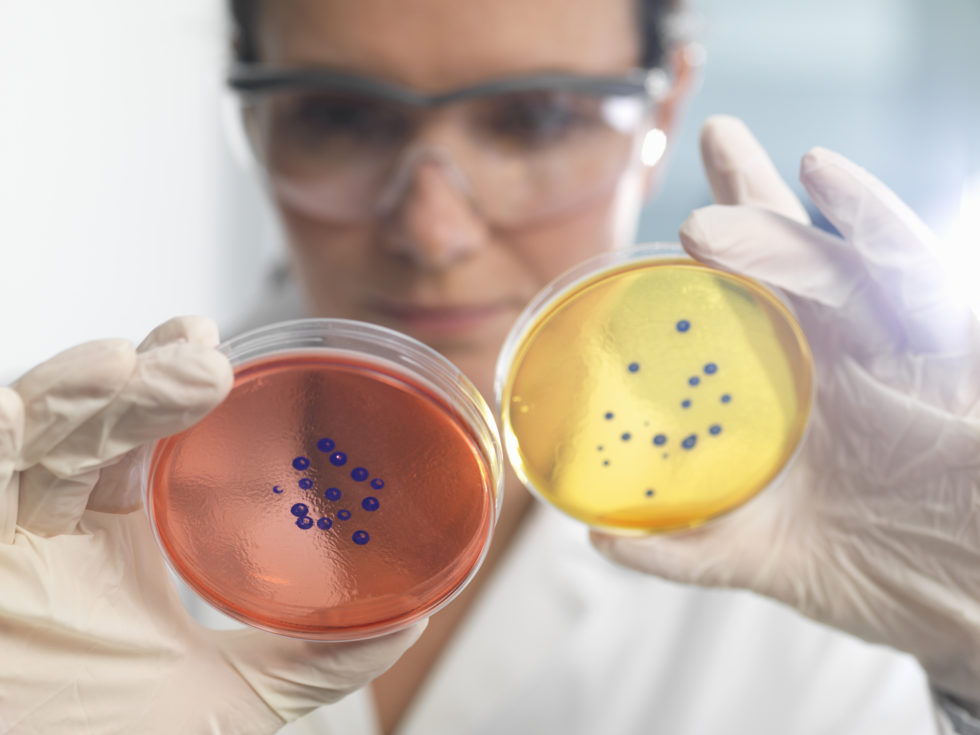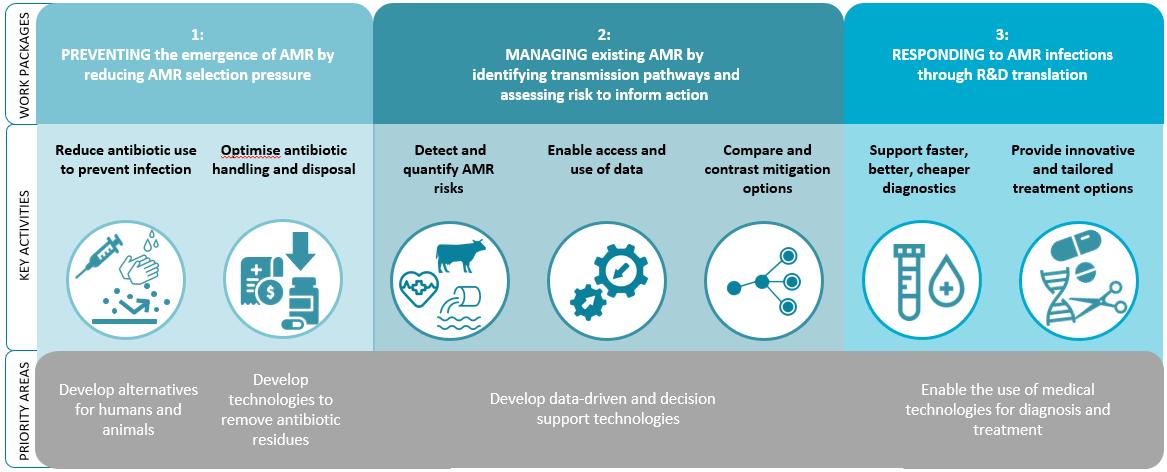As one of the world’s biggest health challenges, Antimicrobial Resistance (AMR) urgently requires a coordinated One Health approach across the human health, animal health and environment sectors.

Solutions that focus solely on treatment and response may provide respite, but they will not stop AMR emerging.
We require a more holistic AMR management approach that includes protecting the efficacy and availability of the medicines we currently have, finding alternatives, and removing antimicrobial residues from our environment.
In addition to new preventative measures and treatments, we also need cost-effective, easy to use, and accurate diagnostic tools, and enhanced surveillance.
For the R&D community, this challenge presents unique opportunities for commercialisation, growth of new industries, and leadership to help secure a brighter future for all of humanity.
The Mission
The Minimising Antimicrobial Resistance Mission, created by CSIRO and the Australian Government Department of Agriculture, Fisheries and Forestry and Department of Health and Aged Care, is seeking partners who can help address this challenge, and who can develop solutions for mitigating AMR now and into the future - through collaboration, funding, and the development of technologies, processes and policies.
brings a unique multidisciplinary perspective across the innovation process, and will use strategy, research, development, and commercialisation to mitigate the impacts of AMR across sectors.
As a Mission partner or collaborator, you will contribute to technologies, processes and policies, and to the securing of funding for cross-organisational collaborations. You will inform governance and management, and report on aligned project progress as part of a unified effort.
What the Mission offers
The Mission can assist in the development and adoption of the necessary science, technology and engineering solutions.
The Minimising AMR Mission team will help provide partners and collaborators with:
- connections to government’s policy and regulatory arms that facilitate the use and adoption of new technologies
- access to additional networks and resources
- expertise relating to value creation, capture and delivery
- marketing opportunities.
| Capability | Network | Collaboration |
|---|---|---|
| Leading capabilities and infrastructure | Connections across government to capture, analyse and apply intelligence | Proven new business models for collaboration (research for equity, spinouts) |
| Lab and pilot-scale experience | Expertise on regulatory practices, policy development and implementation | In-kind funding to help catalyse big programs of work |
| Robust business networks | ||
| Strong intellectual property portfolio |
By connecting organisations addressing the challenge of AMR, the Mission can help find shared solutions through co-funded projects and collaborations with common scope and outcomes and reduce duplication of effort.
The Mission will utilise CSIRO’s experience and capacity for translating research into commercial products, and its extensive expertise in the antimicrobial R&D, including drug discovery and surface technologies for use in human health, agriculture and aquaculture.
With advanced manufacturing and materials research capabilities, CSIRO is also able to offer access to a range of capabilities including:
- Drug discovery: target validation, hit and lead generation
- Biocompatible materials for medical applications
- Production solutions
Download our Antimicrobial Resistance capabilities brochure
- Securing a future where antimicrobials can still save lives
- Securing a future where antimicrobials can still save lives (accessible text only)
The Mission will also have the expertise of our co-creators in the Department of Agriculture, Fisheries and Forestry and the Department of Health and Aged Care to advise on development and broad implementation of solutions and insights into ongoing government initiatives concerning AMR.
The Mission will evaluate R&D pipelines for AMR solutions from scientific discovery through to development and delivery, identifying enablers and barriers along the way.
To drive impact, guide and prioritise effort and investment, specialist partners with additional expertise will be brought on board.
Our focus areas
The Minimising Antimicrobial Resistance Mission will enable the delivery of technologies, processes, and policies that will:
- Prevent the emergence of antimicrobial resistance by reducing selection pressure.
- Manage existing antimicrobial resistance by identifying transmission pathways and assessing risk to inform action.
- Respond to antimicrobial resistance infections with improved diagnoses and treatment.

We have structured our focus areas into three work packages as outlined in the image below:
For more detail on our work packages, download our partnering brochure.
Download our Antimicrobial Resistance partnering brochure
- Help advance Australia's Minimising Antimicrobial Resistance Mission
- Help advance Australia's Minimising Antimicrobial Resistance Mission (accessible text only)
Your activity alignment
The Minimising AMR Mission requires co-development; this means forming meaningful partnerships with government, industry and beyond, to provide the foundation for the initiative.
Only through a collective willingness of government, industry and research across the One Health sectors to commit $50 - $100 million can we effectively address AMR over the next 5 years.
We aim to establish new projects with combinations of funding, however, the value of current AMR projects are a compelling demonstration of the collective efforts to address the issue.
For example, if a partner is already investing $5M in the development of a diagnostic device for a specific bacterial infection, this amount can be counted towards our overall target.
Your commitment
We need you to invest, collaborate, develop and fund activities that contribute towards mitigating AMR, reporting your progress towards the Mission goals.
With the formalisation of a contract or letter of intent, commitment of project alignment and/or dedicated funding, you will be joining this Australian Minimising AMR Mission. We have a number of partner models which can found in our partnering brochure.
Together we can accelerate and champion the AMR challenge, and provide deep and comprehensive impact.
Talk to us about how your organisation can best join the Mission.
As one of the world’s biggest health challenges, Antimicrobial Resistance (AMR) urgently requires a coordinated One Health approach across the human health, animal health and environment sectors.
Solutions that focus solely on treatment and response may provide respite, but they will not stop AMR emerging.
We require a more holistic AMR management approach that includes protecting the efficacy and availability of the medicines we currently have, finding alternatives, and removing antimicrobial residues from our environment.
In addition to new preventative measures and treatments, we also need cost-effective, easy to use, and accurate diagnostic tools, and enhanced surveillance.
For the R&D community, this challenge presents unique opportunities for commercialisation, growth of new industries, and leadership to help secure a brighter future for all of humanity.
The Mission
The Minimising Antimicrobial Resistance Mission, created by CSIRO and the Australian Government Department of Agriculture, Fisheries and Forestry and Department of Health and Aged Care, is seeking partners who can help address this challenge, and who can develop solutions for mitigating AMR now and into the future - through collaboration, funding, and the development of technologies, processes and policies.
brings a unique multidisciplinary perspective across the innovation process, and will use strategy, research, development, and commercialisation to mitigate the impacts of AMR across sectors.
As a Mission partner or collaborator, you will contribute to technologies, processes and policies, and to the securing of funding for cross-organisational collaborations. You will inform governance and management, and report on aligned project progress as part of a unified effort.
What the Mission offers
The Mission can assist in the development and adoption of the necessary science, technology and engineering solutions.
The Minimising AMR Mission team will help provide partners and collaborators with:
- connections to government’s policy and regulatory arms that facilitate the use and adoption of new technologies
- access to additional networks and resources
- expertise relating to value creation, capture and delivery
- marketing opportunities.
| Capability | Network | Collaboration |
|---|---|---|
| Leading capabilities and infrastructure | Connections across government to capture, analyse and apply intelligence | Proven new business models for collaboration (research for equity, spinouts) |
| Lab and pilot-scale experience | Expertise on regulatory practices, policy development and implementation | In-kind funding to help catalyse big programs of work |
| Robust business networks | ||
| Strong intellectual property portfolio |
By connecting organisations addressing the challenge of AMR, the Mission can help find shared solutions through co-funded projects and collaborations with common scope and outcomes and reduce duplication of effort.
The Mission will utilise CSIRO’s experience and capacity for translating research into commercial products, and its extensive expertise in the antimicrobial R&D, including drug discovery and surface technologies for use in human health, agriculture and aquaculture.
With advanced manufacturing and materials research capabilities, CSIRO is also able to offer access to a range of capabilities including:
- Drug discovery: target validation, hit and lead generation
- Biocompatible materials for medical applications
- Production solutions
Download our Antimicrobial Resistance capabilities brochure
- Securing a future where antimicrobials can still save lives PDF (704 KB)
- Securing a future where antimicrobials can still save lives (accessible text only) TXT (10 KB)
The Mission will also have the expertise of our co-creators in the Department of Agriculture, Fisheries and Forestry and the Department of Health and Aged Care to advise on development and broad implementation of solutions and insights into ongoing government initiatives concerning AMR.
The Mission will evaluate R&D pipelines for AMR solutions from scientific discovery through to development and delivery, identifying enablers and barriers along the way.
To drive impact, guide and prioritise effort and investment, specialist partners with additional expertise will be brought on board.
Our focus areas
The Minimising Antimicrobial Resistance Mission will enable the delivery of technologies, processes, and policies that will:
- Prevent the emergence of antimicrobial resistance by reducing selection pressure.
- Manage existing antimicrobial resistance by identifying transmission pathways and assessing risk to inform action.
- Respond to antimicrobial resistance infections with improved diagnoses and treatment.
Work package (WP) 1 is focused on preventing the emergence of AMR by reducing AMR selection pressure. WP1 key activities: WP1 priority areas:
WP2 key activities: WP2 priority areas:
Work package 3 is focused on responding to AMR infections by more accurate and timely diagnoses and treatment. WP3 key activities: WP3 priority areas:
Work package 2 is focused on managing existing AMR by locating antimicrobial-resistant genes, and identifying transmission pathways.
We have structured our focus areas into three work packages as outlined in the image below:
For more detail on our work packages, download our partnering brochure.
Download our Antimicrobial Resistance partnering brochure
- Help advance Australia's Minimising Antimicrobial Resistance Mission PDF (5 MB)
- Help advance Australia's Minimising Antimicrobial Resistance Mission (accessible text only) TXT (14 KB)
Your activity alignment
The Minimising AMR Mission requires co-development; this means forming meaningful partnerships with government, industry and beyond, to provide the foundation for the initiative.
Only through a collective willingness of government, industry and research across the One Health sectors to commit $50 - $100 million can we effectively address AMR over the next 5 years.
We aim to establish new projects with combinations of funding, however, the value of current AMR projects are a compelling demonstration of the collective efforts to address the issue.
For example, if a partner is already investing $5M in the development of a diagnostic device for a specific bacterial infection, this amount can be counted towards our overall target.
Your commitment
We need you to invest, collaborate, develop and fund activities that contribute towards mitigating AMR, reporting your progress towards the Mission goals.
With the formalisation of a contract or letter of intent, commitment of project alignment and/or dedicated funding, you will be joining this Australian Minimising AMR Mission. We have a number of partner models which can found in our partnering brochure PDF (5 MB).
Together we can accelerate and champion the AMR challenge, and provide deep and comprehensive impact.
Talk to us about how your organisation can best join the Mission.
